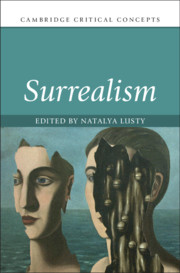Book contents
- Surrealism
- Cambridge Critical Concepts
- Surrealism
- Copyright page
- Contents
- Illustrations
- Notes on Contributors
- Acknowledgments
- Introduction: Surrealism’s Critical Legacy
- Part I Origins: Ideas/Concepts/Interventions
- Chapter 1 The Surrealist World
- Chapter 2 Psychoanalysis
- Chapter 3 Surrealism and the Demand of Politics
- Chapter 4 Modern Science
- Chapter 5 Surrealism and Dreams
- Chapter 6 Surrealism and Eros
- Part II Developments: Practices/Cultures/Material Forms
- Part III Applications: Heterodoxies and New Worlds
- Select Bibliography
- Index
Chapter 1 - The Surrealist World
from Part I - Origins: Ideas/Concepts/Interventions
Published online by Cambridge University Press: 23 July 2021
- Surrealism
- Cambridge Critical Concepts
- Surrealism
- Copyright page
- Contents
- Illustrations
- Notes on Contributors
- Acknowledgments
- Introduction: Surrealism’s Critical Legacy
- Part I Origins: Ideas/Concepts/Interventions
- Chapter 1 The Surrealist World
- Chapter 2 Psychoanalysis
- Chapter 3 Surrealism and the Demand of Politics
- Chapter 4 Modern Science
- Chapter 5 Surrealism and Dreams
- Chapter 6 Surrealism and Eros
- Part II Developments: Practices/Cultures/Material Forms
- Part III Applications: Heterodoxies and New Worlds
- Select Bibliography
- Index
Summary
This chapter explores the exceptional international and diachronic appeal of Surrealism in relation to its programmatic inception as a “world” movement. Along with specific practices, such as International Exhibitions or the Bulletin International du Surréalisme in the 1930s, the chapter investigates the theoretical, epistemological, and political concepts that shaped the Surrealist “world.” Probably the most important of these concepts is Surrealism’s universalist project that sought to rethink the human, informed by psychoanalysis, anthropology, and anti-colonial politics: a new human open to diversity and difference. Surrealism thus cultivated collectively in theory, artistic practice, and political action alike, a flexible and inclusive nonanthropocentric, universal humanism that displaced dominant and rigid humanist visions of the West. Surrealism’s phenomenal success and tremendous cultural impact cannot be dissociated from this conceptual core that ultimately created a vision of the world – its geographical, political, and cultural imaginary.
Keywords
- Type
- Chapter
- Information
- Surrealism , pp. 31 - 45Publisher: Cambridge University PressPrint publication year: 2021

